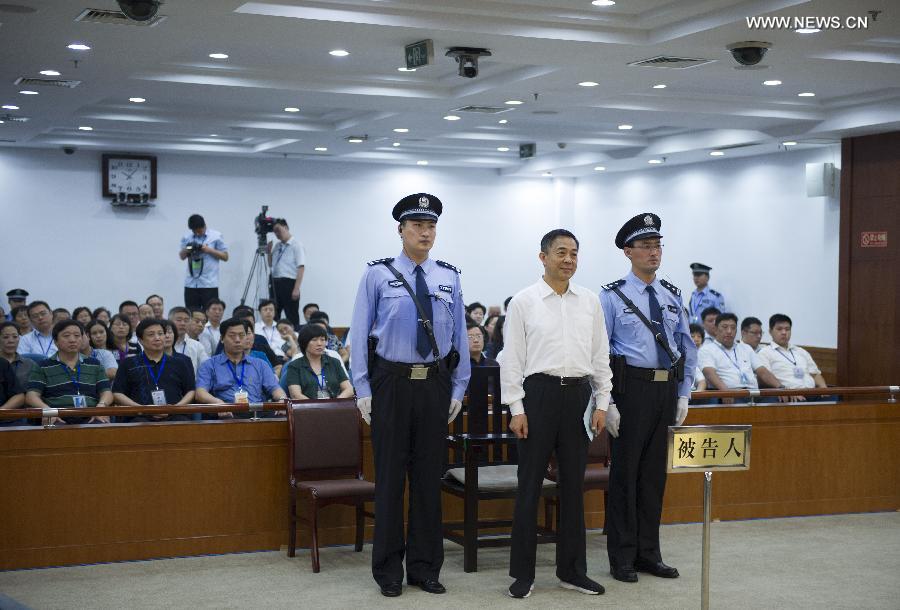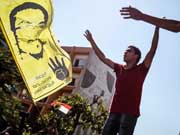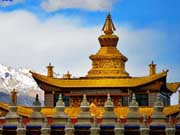 |
| Bo Xilai (C), former secretary of the Chongqing Municipal Committee of the Communist Party of China (CPC) and a former member of the CPC Central Committee Political Bureau, is sentenced to life imprisonment for bribery, embezzlement and abuse of power, at the Jinan Intermediate People's Court in Jinan City, capital of east China's Shandong Province, Sept. 22, 2013. He was deprived of political rights for life. The court announced the verdict. (Xinhua/Xie Huanchi) |
JINAN, Sept. 22 -- Bo Xilai, former secretary of the Chongqing Municipal Committee of the Communist Party of China (CPC) and a former member of the CPC Central Committee Political Bureau, was sentenced to life imprisonment on Sunday for bribery, embezzlement and abuse of power.
He was deprived of political rights for life.
The Jinan Intermediate People's Court in east China's Shandong Province announced the verdict.
Bribes received directly by Bo or via his family totaled 20.44 million yuan (about 3.3 million U.S. dollars), the court decided.
The court also decided that from 1999 to 2012, Bo took advantage of his positions as mayor of the northeastern city of Dalian, secretary of the CPC Dalian City Committee, governor of northeastern Liaoning Province and commerce minister to seek benefits for others.
Bo helped Dalian International Development Co. Ltd., of which Tang Xiaolin was general manager, in taking over the Dalian City liaison office in Shenzhen and also helped Tang obtain quota licenses for importing cars, the court said.
According to court findings, Bo granted Xu Ming, chairman of Dalian Shide Group Co. Ltd., favors in the company's introduction of a football-like sightseeing hot-air balloon and in its bid for a petrochemical project.
The court found that Bo directly accepted cash totaling 1.1 million yuan from Tang. He was aware that his wife Bogu Kailai and their son, Bo Guagua, accepted monetary gains and properties worth 19.33 million from Xu.
According to the verdict, Bo Xilai, while secretary of the Dalian Municipal Committee of the CPC in 2000, assigned Wang Zhenggang, then director of the Dalian municipal bureau of urban and rural planning and land, to take charge of a project to be built by Dalian for a higher authority.
In March 2002, after the project was completed, the higher authority allocated 5 million yuan to refund the project. Wang proposed that Bo, who had moved to become the governor of Liaoning, use money to cover the expenses of his family. Bo consented and asked Wang to approach his wife Bogu Kailai for the matter.
The 5 million yuan was eventually transferred to an account designated by Bogu.
The court's judgement said on Nov. 13, 2011, Bogu and Zhang Xiaojun murdered British citizen Neil Heywood by poisoning him at the Lucky Holiday Hotel in Chongqing. On Nov. 15, Heywood was found dead.
Guo Weiguo, then deputy police chief of Chongqing who was in charge of the Heywood case (also known as the 15/11 case), failed to pursue the case to protect Bogu, the court said.
On Jan. 28, 2012, Wang Lijun, then Chongqing's police chief and vice mayor, told then Chongqing's Party chief and CPC Central Committee Political Bureau member Bo Xilai that Bogu was the suspect.
Bo later lashed out at Wang for framing a murder accusation against Bogu, slapping Wang's face and smashing a cup.
At the request of Bogu, Bo asked Wu Wenkang, then deputy secretary general of Chongqing's Party committee, to launch an investigation against Wang Zhi and Wang Pengfei.
The two had been involved in the investigation of the Heywood case but had then handed over a resignation letter in order to expose the murder case.
Bo asked Chongqing's Public Security Bureau to interrogate Wang Pengfei. Bo proposed and approved the withdrawal of the nomination of Wang Pengfei as a candidate for deputy head of Yubei District of Chongqing.
In his bid to prevent a review of the Heywood case, Bo also violated the organizational procedures and convened a Standing Committee meeting of the CPC Chongqing Municipal Committee to remove Wang Lijun from the position of Chongqing's police chief.
After Wang Lijun's defection to the U.S. Consulate General at Chengdu on Feb. 6, Bo allowed his wife to take part in official meetings to deal with the impact, and sanctioned her suggestion of asking a hospital to fake a diagnosis that Wang suffered from mental illness. Bo also approved the release of the false information that Wang was receiving a "vacation-style treatment."
The verdict said Bo's these actions were important reasons behind Wang's defection and why the Heywood case was not handled in a timely and legal manner.
All these had created an extremely adverse social impact and caused severe loss to interests of the country and its people, the court said.
The court found Bo guilty of bribe-taking, in that as a public servant, he used his power to seek benefits for others and illegally took money and properties from others.
Also as a public servant, Bo took advantage of his position and embezzled public funds with other accomplices, the facts of which constituted the crime of embezzlement.
The court said Bo's abuse of power is extremely serious and has led to huge losses to the state and the people.
The court held that there are sufficient and authentic evidences to support prosecutors' charges against Bo: accepting bribes worth 20.44 million yuan (about 3.3 million U.S. dollars), embezzling public funds of 5 million yuan and abusing his power.
Though Bo himself and his lawyer had denied all three charges, the court said these charges are supported by testimonies by several witnesses including Tang Xiaolin, Xu Ming, Bogu Kailai, Wang Zhenggang, Wang Lijun and others, as well as other evidence such as photographs of physical evidence, documentary evidence and electronic data.
In addition, Bo himself has also confessed to part of the facts, and his confession corroborated with those facts.
The court did, however, exclude 1.34 million yuan from the bribery accepted by Bo, saying that there are not enough evidence to support the charge that Xu Ming paid the amount in air tickets for Bogu Kailai and Bo Guagua and that Bo was aware of this.
The illicit money and goods that Bo accepted as bribes or embezzled have been recovered or compensated, the court said.
The Jinan Intermediate People's Court said its verdict was based on the facts, the nature and the circumstances of Bo's crimes and their harm to the society.

 Children living under fosterage in rural area
Children living under fosterage in rural area  Morsi supporters stage protest across Egypt
Morsi supporters stage protest across Egypt New takeoff and landing test of J-15 fighter held on Liaoning aircraft carrier
New takeoff and landing test of J-15 fighter held on Liaoning aircraft carrier Students wade through water to school
Students wade through water to school  President of Royal Society Paul Nurse visits People’s Daily Online
President of Royal Society Paul Nurse visits People’s Daily Online Travel with photographer—Driving on Sichuan-Tibet Line
Travel with photographer—Driving on Sichuan-Tibet Line "Truth about Tweeting" discussed during Summer Davos
"Truth about Tweeting" discussed during Summer Davos  Naked foreign student sits in the middle of a road in Haikou
Naked foreign student sits in the middle of a road in Haikou 
Day|Week|Month